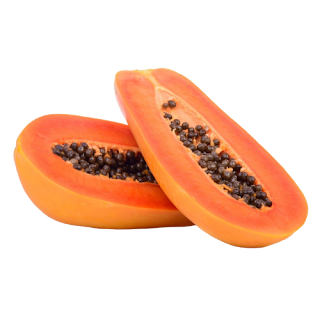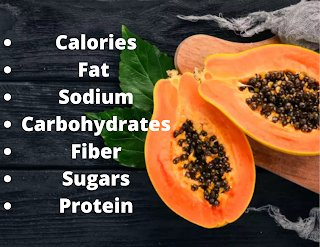PAPAYA- FOOD FOR THE SOUL

Papaya is one of the planet's most nutritionally rich and soothing fruits. In beta carotene, vitamins C & A and minerals such as calcium, phosphorus, potassium, and magnesium, it is extremely strong. It's a fantastic fruit that helps to treat any type of digestive disorder including constipation, acid reflux, bloating, colitis, pancreatitis, irritable bowel syndrome, indigestion, ulcers, celiac disease, and upset stomach.
Papaya has a calming, relaxing effect on the digestive tract and gently removes foreign particles while reducing inflammation and swelling. Its high nutritional value also gives the body all the essential vitamins, minerals, nutrients, proteins and essential fatty acids it requires to repair muscles, tissues, bones and organs.
Papaya has strong anti-viral and anti-inflammatory properties and can offer substantial relief to those affected from joint pain, shingles, chicken pox, arthritis, colds, flu, and autoimmune disorders including fibromyalgia, chronic fatigue syndrome, lyme disease, lupus, and cardiovascular disease.
Papaya is also an outstanding convalescent food and can help heal the body after a long illness or bedridden. If eaten regularly, papaya can greatly improve the skin, hair and nails and keep the eye clear and light. Within the papaya the black seeds are entirely edible and can serve as an effective vermicide or worm / parasite remover. Papaya Contains more Vitamin C than Lemon.
NUTRITION
The USDA offers the following nutrition details for 1 cup (145 g) of raw papaya cut into 1 inch cubes.
Calories: 62Fat: 0.4gSodium: 11.6mgCarbohydrates: 16gFiber: 2.5gSugars: 11gProtein: 0.7g
CARBS
Papaya is a delicious fruit which only contains 62 calories per cup. Most of papaya's calories come from carbohydrates. A serving of papaya contains approximately 16 grams of carbohydrate including fiber (2.5 grams) and naturally occurring sugars (about 11 grams). The papaya glycemic index is 60, and the glycemic value is 9.
VITAMINS & MINERALS
Rich in vitamin C, Papaya includes 88.3 milligrams per serving. For most adults, vitamin C's recommended dietary intake is between 75–90 milligrams, so just about 1 cup of papaya meets 100% of vitamin C requirements.3 Papayas are also an excellent source of vitamin A, and more precisely, carotenoid lycopene.
PAPAYA's UNEXPECTED BENEFITS
BONE HEALTH
 Poor intakes of vitamin K have been related to an increased risk of bone fracture. Adequate intake of vitamin K is essential for good health, as it increases the absorption of calcium and can reduce the urinary excretion of calcium, ensuring that the body has more calcium to reinforce and repair bones.
Poor intakes of vitamin K have been related to an increased risk of bone fracture. Adequate intake of vitamin K is essential for good health, as it increases the absorption of calcium and can reduce the urinary excretion of calcium, ensuring that the body has more calcium to reinforce and repair bones.DIGESTION
Papayas include an enzyme called papain which helps with digestion; it can actually be used as a meat tenderizer. Papaya also has a high content of fiber and water, both helping to prevent constipation and encouraging regularity and a balanced digestive system.
PROTECTS VISION
 Vitamin A is important for good vision and it is an excellent source for papayas. Beta carotene is the type of vitamin A that we consume in foods made from fruits, vegetables and some protein. Although the carrots are safe for your eyes, studies show that beta-carotene is three times more bioavailable in papayas (i.e. easier to absorb) in carrots or tomatoes than beta-carotene is.
Vitamin A is important for good vision and it is an excellent source for papayas. Beta carotene is the type of vitamin A that we consume in foods made from fruits, vegetables and some protein. Although the carrots are safe for your eyes, studies show that beta-carotene is three times more bioavailable in papayas (i.e. easier to absorb) in carrots or tomatoes than beta-carotene is.HEART DISEASE
 The amount of protein, potassium, and vitamins in papaya all help prevent heart disease. The most significant dietary change a person can make to reduce their risk of cardiovascular disease is an increase in potassium intake along with a decrease in sodium intake.
The amount of protein, potassium, and vitamins in papaya all help prevent heart disease. The most significant dietary change a person can make to reduce their risk of cardiovascular disease is an increase in potassium intake along with a decrease in sodium intake.INFLAMMATION
Choline is a very essential and flexible nutrient found in papayas that supports sleep, muscle control, learning and memory in our bodies. Choline also helps preserve the integrity of cellular membranes, helps transmit nerve impulses, helps absorb fat and decreases chronic inflammation.
SKIN HEALTH
 Mashed papaya tends to be helpful when used topically to facilitate wound healing and to prevent infection of burnt areas. Researchers assume the proteolytic enzymes that are responsible for their beneficial effects are chymopapain and papain in papaya. Decubitus ulcers (bedsores) have also been diagnosed with ointments containing the papain enzyme. There are other remedies for skin health.
Mashed papaya tends to be helpful when used topically to facilitate wound healing and to prevent infection of burnt areas. Researchers assume the proteolytic enzymes that are responsible for their beneficial effects are chymopapain and papain in papaya. Decubitus ulcers (bedsores) have also been diagnosed with ointments containing the papain enzyme. There are other remedies for skin health.HAIR HEALTH
Papaya is also excellent for hair as it contains vitamin A, a nutrient required to produce sebum that keeps hair moisturized. The growth of all body tissues, including the skin and hair, includes vitamin A too. Adequate intake of vitamin C, which can be supplied by papaya, is required to build and sustain collagen, which provides skin structure. Hair health can become more glossy with home remedies.
RISKS
Because papayas contain enzymes called chitinases, people with a latex allergy can also be allergic to papaya. They can cause a cross-reaction between latex and its foods. To others, ripe papaya can have an off-putting odor and reduce this odor by combining the cut fruit with lime juice. The papaya seeds are perfectly healthy to eat, though unpleasant to others.






0 comments:
Post a Comment